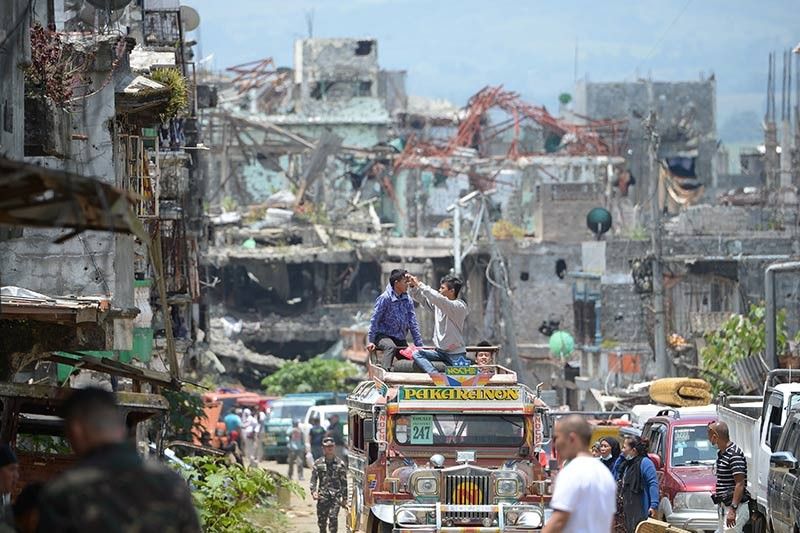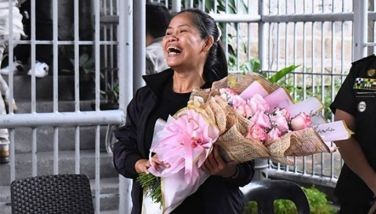Painful homecoming to battle-torn Marawi
April 2, 2018 | 9:08am

Residents on top of their jeepney take photos of destroyed buildings during a visit to their homes at the main battle area in Marawi City, in southern island of Mindanao on April 1, 2018. After fleeing for their lives nearly a year ago, residents of the battle-scarred Philippine city of Marawi made their first visit back on April 1 to dig through the rubble that was once their homes.
Ted Aljibe / AFP
MARAWI, Philippines — After fleeing for their lives nearly a year ago, some residents of the battle-scarred city of Marawi were allowed back Sunday for the first time—to dig through the rubble that was once their homes.
Swathes of the southern city were destroyed in five months of house-to-house fighting between troops and jihadists loyal to the Islamic State group that killed nearly 1,200.
The stunned and tearful residents, who once lived in what became the main battle zone, had not been allowed home until now due to fears of unexploded bombs still buried in the ruins.
Authorities finally relented as rebuilding plans are moving forward, which will likely result in many of the worst-hit areas being razed.
On Sunday some 7,000 residents returned, digging charred furniture and broken toys from the rubble left by the battles that broke out in May 2017.
"I cried in anger, pain," Samsida Mangcol, 44, told AFP of the moment she saw what was left of her bridal boutique, which now has "I love ISIS" spray-painted across one its walls.
"I used to rent out clothes but now I have become a beggar, asking my relatives for things to eat and wear," the mother-of-three said as she caressed a ruined wedding gown.
Marawi on Mindanao island, the principal Islamic city in the mainly Catholic Philippines, was besieged by hundreds of local and foreign gunmen waving black IS flags who attacked it in what authorities said was an attempt to establish a Southeast Asian base.
'We crawled in fear'
Over the course of the next month, other groups of residents will be allowed to return for up to three days each, to view their old homes and salvage what they can before rebuilding starts.
Sunday's group walked forlornly through streets littered with rubble, twisted metal and the skeletons of bullet-riddled cars.
"Our house was still new when we left it. We had prepared everything for Ramadan (the Islamic fasting month)," said Maimona Ambola, a 44-year-old mother of seven.
"A bomb has destroyed it all. Our bed has turned into ashes."
The battle, which ended in October, was the biggest security crisis under firebrand President Rodrigo Duterte. The destruction was similar to that inflicted on Aleppo or Mosul, military and local officials say.
Many of the city's 200,000 residents fled their homes in a rush for safety, including more than 10,000 people from the so-called "ground zero". They have since been living in evacuation centers or with relatives in other towns.
Months after the fighting ended, residents still visited at their own risk.
The conflict zone has 53 unexploded bombs from military airstrikes weighing as much as 226 kilograms (500 pounds) as well as explosives left behind by the militants, according to Colonel Romeo Brawner, deputy commander of the military task force in Marawi.
"We lack the equipment to excavate the bombs. One bomb we recovered, for example, took us five days because we had to dig 10 meters deep and 10 meters wide," Brawner told AFP, adding the military aimed to finish the effort by June.
The threat posed by those bombs as well as memories of their flight were uppermost in the minds of Sunday's visitors.
"We crawled in fear... We brought nothing but the clothes on our backs. We left because we thought the soldiers were about to respond and there would be a gunfight," said Mangcol, the bridal shop owner, of her escape.
"A bullet does not recognize a civilian from a terrorist."
BrandSpace Articles
<
>
Philstar
- Latest
- Trending
Trending
Latest






























